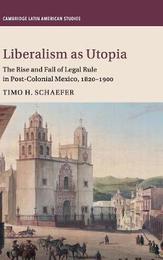
|
Liberalism as Utopia: The Rise and Fall of Legal Rule in Post-Colonial Mexico, 1820-1900
Hardback
Main Details
| Title |
Liberalism as Utopia: The Rise and Fall of Legal Rule in Post-Colonial Mexico, 1820-1900
|
| Authors and Contributors |
By (author) Timo H. Schaefer
|
| Series | Cambridge Latin American Studies |
|---|
| Physical Properties |
| Format:Hardback | | Pages:258 | | Dimensions(mm): Height 236,Width 158 |
|
| ISBN/Barcode |
9781107190733
|
| Classifications | Dewey:972.04 |
|---|
| Audience | | Postgraduate, Research & Scholarly | |
|---|
| Illustrations |
Worked examples or Exercises
|
|
Publishing Details |
| Publisher |
Cambridge University Press
|
| Imprint |
Cambridge University Press
|
| Publication Date |
7 August 2017 |
| Publication Country |
United Kingdom
|
Description
Liberalism as Utopia challenges widespread perceptions about the weakness of Mexico's nineteenth-century state. Schaefer argues that after the War of Independence non-elite Mexicans - peasants, day laborers, artisans, local merchants - pioneered an egalitarian form of legal rule by serving in the town governments and civic militias that became the local faces of the state's coercive authority. These institutions were effective because they embodied patriarchal norms of labor and care for the family that were premised on the legal equality of male, adult citizens. The book also examines the emergence of new, illiberal norms that challenged and at the end of the century, during the dictatorship of Porfirio Diaz, overwhelmed the egalitarianism of the early-republican period. By comparing the legal cultures of agricultural estates, mestizo towns and indigenous towns, Liberalism as Utopia also proposes a new way of understanding the social foundations of liberal and authoritarian pathways to state formation in the nineteenth-century world.
Author Biography
Timo H. Schaefer received his Ph.D. in History from Indiana University. Between 2015 and 2017 he was a postdoctoral fellow at the University of British Columbia.
Reviews'This is a remarkable study of Mexican legal culture and local experiments in inclusion. Following the long tail of early nineteenth-century revolutions and the egalitarian aspirations of their protagonists, Schaefer shows how these ideals took institutional roots. Though legal equality ran challenged by social hierarchies, townsfolk and hacienda settlers forged their own egalitarian, ethical worlds.' Jeremy I. Adelman, Princeton University, New Jersey 'Liberalism as Utopia is an impressive rethinking of nineteenth-century Mexican history that challenges long-held orthodoxies about nation and state formation. Timo H. Schaefer convincingly unites social, legal and political history, to tell a remarkable story of Mexico's experiment with liberal and egalitarian legal cultures, especially at the level of local, lived experience.' James E. Sanders, Utah State University 'Timo H. Schaefer examines revolutionary liberalism to rethink nineteenth-century Latin America, Mexico in particular. He not only revives important debates about politics, regionalism, law, and the lower classes, but also contributes to our understanding of liberalism and the utopian quest for social justice. This is an engaging, timely book that deserves a broad readership.' Charles F. Walker, University of California, Davis 'Liberalism as Utopia is a remarkable, learned, and original work. By placing engagement with the law at the heart of popular politics, Timo H. Schaefer has redefined how we should view nineteenth-century liberalism not only in Mexico, but also throughout Latin America and even Europe. If there is any justice (and if this book teaches us anything - it is that this is relatively rare), this work should inspire numerous comparative works on what Schaefer terms 'legal culture' in decades to come.' Benjamin T. Smith, University of Warwick 'Schaefer is pushing toward a new and nuanced understanding of nineteenth-century liberal politics in Mexico. He shows how the unheroic and fractured experience of law drove conflicts over who was to control liberalism's meaning and possibility. The book is crucial for anyone with an interest in the origins and fate of liberal polities in the post-independence period.' Brian P. Owensby, University of Virginia 'Schaefer gives us a bold, powerful and clearly written book ... Schaefer's study, in other words, deserves a wide readership among scholars of Mexico, Latin America and political regimes in the nineteenth-century world.' Edward Beatty, The English Historical Review
|